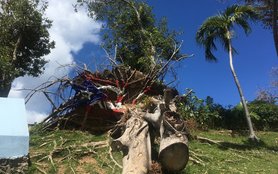As a catastrophic flood emergency unfolded in 2022, Oxfam made an important decision: support a partner-led response.
When the rains began, I was happy. I knew they would quench the thirst of my parched country. But they were ceaseless, and soon I was praying for them to stop. Living in Islamabad, I only faced minor inconveniences, like flooding in some areas of my house. But I knew that across the country farms and homes and towns were being submerged, putting countless lives at risk and plunging struggling families deeper into poverty.
As Oxfam in Pakistan set out to respond, our priorities included reaching hard-hit communities that might not otherwise receive assistance, making sure women and other groups whose needs are often neglected received appropriate aid, and acting on the principles of local humanitarian leadership.
To make this happen in the best possible way, we agreed with local and national organizations that the response would not only involve collaboration with partners—it would be led by them.
Why? Because the Pakistani organizations we work with knew the terrain and were active and well accepted in many of the communities we aimed to assist, and because as capable local actors, they deserved not only funding but the power to make decisions about how that money was spent.
Working with partners—then and now
If we were working in a more traditional way, Oxfam would have identified the programmatic areas of work and explained to partners what percentage of the emergency response budget they were authorized to spend on water, sanitation, social protection, food security, etc. There would have been little room for community and partner voices in the program design.
But in this response, we turned that process on its head: the partners themselves made all the key decisions. For example, Oxfam and partners collaborated on the creation of the action and procurement plans, but partners led the processes and determined the allocation of funds to the different thematic areas.
When it came to capacity strengthening, in the past we would have offered trainings based on gaps we perceived in our partners’ skills and knowledge; in this case, the partners performed self-assessments and figured out how to address the deficits in skills and knowledge that they themselves had identified—drawing on Oxfam’s expertise when and if they chose to.
As the flood response unfolded, Oxfam helped strengthen partner capacity in areas like financial systems, media and communications, human resources, anti-fraud measures, and safe programming (ensuring that programs don’t cause harm to participants), and we provided technical support for the programs themselves (water, sanitation, and hygiene; social protection; and distribution of multi-purpose cash). But this was no longer part of a top-down process: the local organizations were in charge.
Shifting not only funds but also decision-making power to local and national organizations is part of Oxfam in Pakistan’s effort to ensure that the humanitarian responses we support are respectful of local knowledge and leadership, culturally appropriate, sustainable, and tailored to local needs. It is also a step in the direction of decolonizing aid—of challenging a paradigm that has long deprived local and national organizations of the chance to fulfill their potential.
Women’s rights at the center
Hard as the floods would be for everyone whose home and land and community were inundated, we knew the struggles would be amplified for women, whose household responsibilities are heavy and who are not allowed to exercise their rights on so many levels. That meant working closely with women’s rights organizations (WROs) was a top priority.
Most WROs in Pakistan struggle for funding and are therefore small, and most lack experience in humanitarian response. Oxfam and partners alike agreed that if we were to mount a response that embodied justice for women, we needed the knowledge, perspective, networks, and commitment they brought to the table, so we made sure WRO partners were well represented in all the discussions and that they were not sidelined because of their size or their gaps in technical capacity.
The response: timely and inclusive
The response was a success. Local partners worked in six districts and reached more than 375,000 people with assistance.
Women received hygiene and dignity kits in a very timely way, and people reported using the cash they received for a host of important purposes, like health-related expenses and paying off loans, along with food and other basics. Partners distributed winterization kits, as well, that included shawls, gloves, and sweaters—items carefully chosen to integrate seamlessly into people’s lives. But rather than requiring that everyone show up at distribution centers, they delivered kits to pregnant women and people with disabilities, and to transgender people who were wary of visibility.
We are now working with partners to form a network (known as the Climate and Humanitarian Action Network for Growth and Engagement, or CHANGE) that is designed to help Pakistani organizations respond to future emergencies, reduce disaster risks, advocate for policy change, and attract funding for their work.
Facing the future
The floods of 2022 inundated a third of the country. What will the floods of 2023 or 2033 look like?
Every country in the world is feeling the effects of climate change, and needs its own skilled, confident humanitarian and women’s rights organizations to take charge in future crises.
Oxfam is reconfiguring its role in emergencies to help make that possible—shifting from leading to supporting local leadership—in hopes that our humanitarian responses will not only save lives in the moment but strengthen the organizations that future lives depend on.


